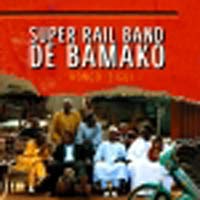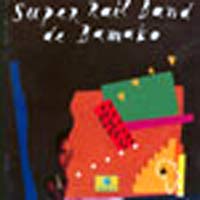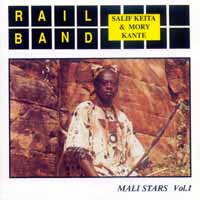| 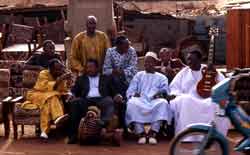 Super
Rail Band
de Bamako Salif Keita et Mory
Kanté firent leurs premiers pas au sein de cet orchestre mythique.
Inédites et récentes, les chansons originales ou puisées aux traditions,
célèbrent le courage, l'honnêteté, le respect d'autrui, … Super
Rail Band
de Bamako Salif Keita et Mory
Kanté firent leurs premiers pas au sein de cet orchestre mythique.
Inédites et récentes, les chansons originales ou puisées aux traditions,
célèbrent le courage, l'honnêteté, le respect d'autrui, …
Voix haut
perchées et mélodies ondoyantes, cuivres colorés et guitares ébouriffantes
font carburer la locomotive d'or de Bamako, qui bourlingue du blues
de la savane au rock mandingue urbain.
Au Mali, où la musique traditionnelle a toujours fait preuve d'une vitalité
extraordinaire, il fallut attendre 1970 pour que 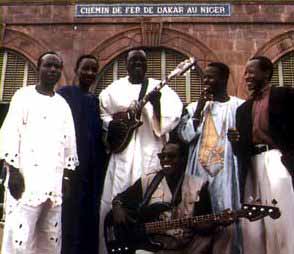 naisse
le premier groupe de "folklore modernisé" comme on appelait alors la
musique africaine électrifiée. Ce groupe, le Super
Rail Band du Buffet-hôtel de la gare de Bamako, sera à la musique
mandingue moderne ce que furent E. T. Mensah
au high-life (Ghana), Mahlathini au mbaqanga
(Afrique du Sud) ou I.K. Dairo à la juju
music (Nigeria). naisse
le premier groupe de "folklore modernisé" comme on appelait alors la
musique africaine électrifiée. Ce groupe, le Super
Rail Band du Buffet-hôtel de la gare de Bamako, sera à la musique
mandingue moderne ce que furent E. T. Mensah
au high-life (Ghana), Mahlathini au mbaqanga
(Afrique du Sud) ou I.K. Dairo à la juju
music (Nigeria).
Ses chanteurs successifs - dont l'Occident connaît surtout les deux
premiers, Salif Keita et Mory
Kanté - seront les superstars incontestées de la scène malienne
jusqu'à l'avènement de la musique du Wassoulou dans les années 90.
Depuis la soirée mémorable du premier concert du Rail
Band en mars 1970, où Salif
Keita chanta du fond de la scène et la tête couverte d'une serviette
de bain tant il avait honte de s'abaisser au métier de griot,
bien de l'eau a passé sous les ponts du Niger, et le groupe a connu
ses moments de doute. Ainsi au milieu des années 70 enregistrait-il
à Lagos deux albums de rumba, pour tenter d'épouser la mode zaïroise
qui balayait l'Afrique. Puis vint la mode des "musiques du monde" en
Occident, et le Rail Band revint tout doucement
au beau style mandingue de ses débuts, le seul dans lequel il se savait
inégalable.
Mais après
plus de 25 ans de carrière, un groupe a besoin d'évoluer. C'est au niveau
du son qu'il pouvait le faire, sans trahir la pureté de son style. Ce
nouvel album garde l'ample respiration héritée des griots,
les mélodies superbes, les guitares acides en contrepoint de cuivres
berceurs, mais le mix est moderne. Notre écoute a changé, et le présent
enregistrement réalisé avec le concours de Xavier
Jouvelet (percussionniste de Ray Lema
et Papa Wemba) rend compte de cette évolution.
L'accompagnement de Jean-Philippe Rykiel,
"seul blanc à sonner comme un africain" selon Salif
Keita, donne à la musique une profondeur inédite. Les cuivres, augmentés
de musiciens parisiens, suivent scrupuleusement les riffs originaux,
tandis qu'à la guitare solo Djelimady
Tounkara fait, comme toujours, des merveilles de précision liquide.
Ces deux albums enregistrés sur Indigo, le premier éponyme et le second
Mansa, viennent couronner 25 années d'une carrière formidable, et prouver
la longévité d'un des plus grands groupes du continent africain.
|
|  Salif
Keita
and Mory Kanté took their first
steps in music with this mythical band. All the songs are recent and
unprecedented, and whether they are original or inspired by tradition,
they are a celebration to courage, honesty, respect for others… Salif
Keita
and Mory Kanté took their first
steps in music with this mythical band. All the songs are recent and
unprecedented, and whether they are original or inspired by tradition,
they are a celebration to courage, honesty, respect for others…
High-pitched
voices and undulating melodies, colourful brass and unbelievable guitars
are the fuel for Bamako's golden locomotive, which thunders from savannah
Blues to urban Manding rock.
In Mali, where traditional music has always been of an extraordinary
vitality, the birth of the first "modernised folk" band, as African
electric music was then called, was not witnessed until 1970.
This group, the Super Rail Band of Bamako,
was to become to modern Manding music what E.
T. Mensah was to High-Life (Ghana), what Mahlathini
was to Mbaqanga (South Africa) and what I. K.
Dairo was to Juju Music (Nigeria). The band's successive singers
- of whom the first two, Salif Keita
and Mory Kante, are best known in
the West - were to become the uncontested superstars of the Malian musical
scene right up until the arrival of Wassoulou music in the nineties.
 However,
at lot has happened since the memorable night of the Rail
Band's first concert in March 1970, when Salif
Keita sang from the back of the stage, his head covered by a bath
towel, so great was his shame in lowering himself to the level of Griot,
and the group has had its moments of doubt. They thus recorded two rumba
albums in the mid-seventies in an attempt to join the Zairian trend
that was sweeping across Africa at the time. Then came the craze for
"World Music" in the West and the Rail Band
gently returned to their original Manding style, knowing that they were
unequalled in this style. But after a career spanning more than 25 years,
a group needs to evolve. It was with their sound that they could do
so, without betraying the purity of their style. However,
at lot has happened since the memorable night of the Rail
Band's first concert in March 1970, when Salif
Keita sang from the back of the stage, his head covered by a bath
towel, so great was his shame in lowering himself to the level of Griot,
and the group has had its moments of doubt. They thus recorded two rumba
albums in the mid-seventies in an attempt to join the Zairian trend
that was sweeping across Africa at the time. Then came the craze for
"World Music" in the West and the Rail Band
gently returned to their original Manding style, knowing that they were
unequalled in this style. But after a career spanning more than 25 years,
a group needs to evolve. It was with their sound that they could do
so, without betraying the purity of their style.
Their latest
album preserves the ample breathing inherited from the Griots,
the superb melodies, the acid guitars which counterbalance the soothing
brass, but the mix is modern.
Our way of listening has changed and this recording, produced with the
assistance of Xavier Jouvelet (percussionist
for Ray Lema and Papa
Wemba) takes this change into account. Jean-Philippe
Rykiel's accompaniment, "the only white to sound like an
African" according to Salif Keita,
adds a new depth to the music. The brass section, augmented by a number
of Parisian musicians, scrupulously follows the original riffs, while
Djelimady Tounkara delivers,
as ever, marvellously precise and fluid guitar solos.
These
two albums on Indigo, the first one eponymous, the second Mansa, crown
a remarkable twenty-five year career and attest to the longevity of
one of Africa's greatest groups. |
 Super
Rail Band
de Bamako
Super
Rail Band
de Bamako  naisse
le premier groupe de "folklore modernisé" comme on appelait alors la
musique africaine électrifiée. Ce groupe, le Super
Rail Band du Buffet-hôtel de la gare de Bamako, sera à la musique
mandingue moderne ce que furent E. T. Mensah
au high-life (Ghana), Mahlathini au mbaqanga
(Afrique du Sud) ou I.K. Dairo à la juju
music (Nigeria).
naisse
le premier groupe de "folklore modernisé" comme on appelait alors la
musique africaine électrifiée. Ce groupe, le Super
Rail Band du Buffet-hôtel de la gare de Bamako, sera à la musique
mandingue moderne ce que furent E. T. Mensah
au high-life (Ghana), Mahlathini au mbaqanga
(Afrique du Sud) ou I.K. Dairo à la juju
music (Nigeria). 